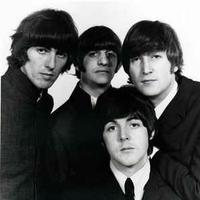Burning Records
Brennende Aufzeichnungen
Burning Records
Discos ardientes
バーニング・レコード
레코딩 레코드
Gravadora Burning
Спалювання записів
燃烧记录
In 1966, John spoke to a reporter in London.
У 1966 році Джон розмовляв з репортером у Лондоні.
They were talking about the modern church, and he said, 'We're more popular than Jesus now.'
Вони говорили про сучасну церкву, і він сказав: «Ми зараз популярніші, ніж Ісус».
他們在談論現代教會,他說,“我們現在比耶穌更受歡迎。”
When John's words were reported in the US a few months later, many people were angry.
Коли через кілька місяців у США повідомили про слова Джона, багато людей розлютилися.
幾個月後,當約翰的言論在美國被報導時,許多人感到憤怒。
There were newspaper stories like 'Lennon Says that the Beatles are Bigger than Jesus'.
Були газетні статті на кшталт «Леннон каже, що Бітлз більші за Ісуса».
有像“列儂說披頭士比耶穌大”這樣的報紙報導。
This wasn't what John meant.
Джон мав на увазі не це.
But some shops refused to sell their records.
|||verweigerten||||
Але деякі магазини відмовилися продавати свої записи.
Some radio stations refused to play them.
A few radio stations asked listeners to burn their Beatles records.
ある||||||||||
Кілька радіостанцій попросили слухачів спалити свої записи Beatles.
一些廣播電台要求聽眾燒掉披頭士樂隊的唱片。
Years later, Ringo joked, 'It was OK for us, because then they bought them again!'
||||それは||||私たち||||||
Через роки Рінго пожартував: «Для нас це було нормально, бо потім вони їх знову купили!»
多年後,Ringo 開玩笑說:“這對我們來說沒問題,因為他們又買了它們!”
But at the time, the band and their manager were worried.
Але в той час група та їхній менеджер хвилювалися.
So what did John mean?
それで||||
Отже, що мав на увазі Джон?
He tried to explain his words to the American people before the band toured the country again.
Він намагався пояснити свої слова американському народу перед тим, як група знову поїхала по країні.
'I was just saying it as a fact,' he explained.
私|||||||||
「事実として言っただけです」と彼は説明した。
«Я просто сказав це як факт», — пояснив він.
'It is true - more for England than here.
|||特に||||
「それは本当です - ここよりもイングランドのためです。
«Це правда — більше для Англії, ніж тут.
“這是真的——英格蘭比這裡更多。
I'm not saying that we're better or greater... I'm sorry that I opened my mouth.'
私は||||||||ごめん||||||
私たちが優れているとか、偉大だとか言っているのではない......。口を開いたことを後悔している。
Я не кажу, що ми кращі чи кращі... Вибачте, що я розкрив рота».
It was a bad start to the Beatles last tour.
ビートルズ最後のツアーのスタートは最悪だった。
Це був поганий початок останнього туру Beatles.
甲殼蟲樂隊上次巡演的開端很糟糕。

